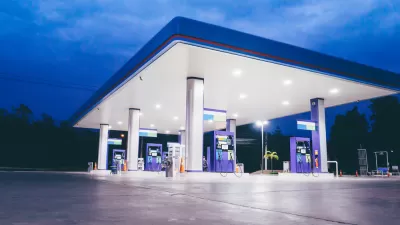With the two Democrat candidates debating who is the real progressive, it would be interesting to see how they would respond, if asked, about President Obama's proposed $10-per-barrel fee to fund a 21st Century Clean Transportation System.
On Tuesday, President Obama presents his 2017 budget to Congress. Among its more controversial items will be a phased $10-per-barrel oil fee over five years, to be paid by oil companies, to fund the 21st Century Clean Transportation System in addition to basic road and bridge infrastructure paid by the the Highway Trust Fund.
In his editorial blog, Vikas Bajaj, who covers business and international economics for The New York Times editorial board, writes that "the administration would use the $32 billion the tax would raise to invest in mass transit, high-speed rail and research into clean energy and self-driving cars."
Of course, the Republicans who control Congress — and who deny that human activity is causing climate change — are already denouncing the idea, as is the oil industry. That’s why it is unlikely to become law soon.
That's pretty much a given, though it will be interesting to see how some Republicans who have supported increasing the gas tax, such as Sen. Bob Corker (Tenn.) and Rep. Tom Rice (S.C.), react to the measure.
More important will be how former Secretary of State Hillary Clinton and Sen. Bernie Sanders, both vying for the Democratic nomination for president, react. The two have been debating who is the true "progressive."
Some background information from their campaigns and past campaigns
- Clinton has pledged not to raise taxes on the middle class, while Sanders has already indicated that such taxes would be necessary to implement his "Medicare for all" health plan.
Readers may recall that while Obama is now proposing what is essentially a gas tax in his last year in office, he has consistently opposed raising the gas tax, presumably because of his promise not to raise taxes on the middle class.
- In her 2008 presidential primary campaign against then Sen. Senator Obama (Ill.), Clinton supported a "gas tax holiday," first proposed by then Republican candidate Sen. John McCain (Az.), but opposed by candidate Obama.
Back to Bajaj's blog. He makes a good case as to why the oil fee can be viewed as progressive:
As the editorial board wrote recently [posted here], taxing sources of carbon emissions is an effective way to reduce the use of these polluting fuels and to generate revenue that can be used in a variety of ways, including reducing other taxes and investing in transportation and research. British Columbia (B.C.) has imposed a modest carbon tax since 2008 and has cut emissions without hurting its economy.
Regressive? Yes....but....
Bajaj adds:
There is no question the fee will increase the cost of gasoline, diesel and other fuels and products made from oil. That’s the point. But with oil trading at around $32 a barrel, this is an ideal time to start imposing a carbon tax. It would be easier for individuals and businesses to adjust to such a tax now than it would have been less than two years ago, when oil was at more than $100 a barrel.
Bajaj could have written more about the B.C. carbon tax, which can be viewed as progressive as it is used to reduce income taxes, as a 2012 post indicates:
"British Columbia has lowered its corporate income tax rate to 10 percent from 12 percent, a rate that is among the lowest in the Group of 8 wealthy nations. Personal income taxes for people earning less than $119,000 per year are now the lowest in Canada, and there are targeted rebates for low-income and rural households."
The above-cited editorial notes that the B.C. carbon tax is the highest in North America, comparing it to carbon cap-and-trade programs elsewhere. It classifies the carbon tax as revenue-neutral for the aforementioned reasons.
British Columbia, which is home to 4.7 million people, has placed the highest price on emissions in North America, taxing a ton of carbon emitted at 30 Canadian dollars, or about $21. By comparison, emission permits in California and Quebec are trading at about $13 a ton. And permits sold for $7.50 a ton in a December auction in the Northeastern trading system known as the Regional Greenhouse Gas Initiative. That system covers emissions from power plants in nine states that include Connecticut, New York and Massachusetts.
But if it's a foregone conclusion that Republican opposition will ensure that the oil barrel fee goes nowhere, why introduce it? Bajaj takes a positive outlook here. No one expected marriage equality to become the law of the land, or health care reform to pass, he opines. And polls show that "a majority of Americans believe climate change has already begun."
FULL STORY: It’s Time to Talk About Taxing Oil

Study: Maui’s Plan to Convert Vacation Rentals to Long-Term Housing Could Cause Nearly $1 Billion Economic Loss
The plan would reduce visitor accommodation by 25,% resulting in 1,900 jobs lost.

Alabama: Trump Terminates Settlements for Black Communities Harmed By Raw Sewage
Trump deemed the landmark civil rights agreement “illegal DEI and environmental justice policy.”

North Texas Transit Leaders Tout Benefits of TOD for Growing Region
At a summit focused on transit-oriented development, policymakers discussed how North Texas’ expanded light rail system can serve as a tool for economic growth.

Nevada Bills Aim to Establish Home Insurance Assurance Amidst Wildfire Risk
Republican sponsor hopes the FAIR plan would be “a true market of last resort.”

Virginia Law Allows Judges to Mandate Speed Limiters
The law could set a new precedent for speed limiting tech on U.S. vehicles.

Comment: EPA Cuts will Send Atlanta Back to Eye-burning Ozone, Lung-damaging Smog, and Raw Sewage in the Chattahoochee River
A veteran political journalist takes stock of the hard-earned ground Georgia stands to lose with slashed environmental protection.
Urban Design for Planners 1: Software Tools
This six-course series explores essential urban design concepts using open source software and equips planners with the tools they need to participate fully in the urban design process.
Planning for Universal Design
Learn the tools for implementing Universal Design in planning regulations.
City of Santa Clarita
Ascent Environmental
Institute for Housing and Urban Development Studies (IHS)
City of Grandview
Harvard GSD Executive Education
Toledo-Lucas County Plan Commissions
Salt Lake City
NYU Wagner Graduate School of Public Service





























